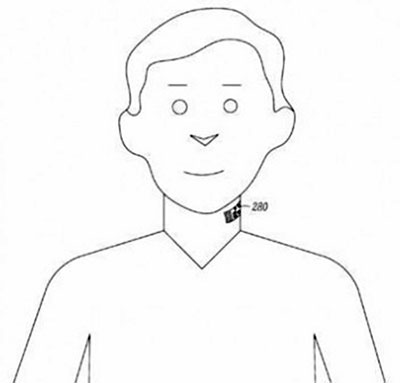 Susanne
Posel
Susanne
Posel
Occupy Corporatism
November 15, 2013
Motorola Mobility, a Google-owned tech corporation, has filed a patent on a system "that comprises an electronic skin tattoo capable of being applied to a throat region of a body."
According to the patent: "Optionally, the electronic skin tattoo can further include a galvanic skin response detector to detect skin resistance of a user. It is contemplated that a user that may be nervous or engaging in speaking falsehoods may exhibit different galvanic skin response than a more confident, truth telling individual."
Another perk of the tattoo is that it can be adhered to a "collar or a band around the userís neck".
This patent includes the ability of the tattoo to function as a lie detector.
The patent explains how the technology can be used as a polygraph machine: "Optionally, the electronic skin tattoo can further include a galvanic skin response detector to detect skin resistance of a user. It is contemplated that a user may be nervous or engaging in speaking in falsehoods may exhibit different galvanic skin response than a more confident, truth telling individual."
Other advantages of the patent explain that "mobile communication devices are often operated in noisy environments. For example, large stadiums, busy streets, restaurants, and emergency situations can be extremely loud and include varying frequencies of acoustic noise. Communication can reasonably be improved and even enhanced with a method and system for reducing the acoustic noise in such environments and contexts."
Indeed, this technology would be used on humans only.
The patent states: "Here it is contemplated that the electronic tattoo can be applied to an animal as well. Audio circuitry can also include a microphone for emitting sound corresponding to fluctuations of muscle or tissue in the throat."
In June, The Motorola Pill, a.k.a. the authentication vitamin, is a stomach acid-powered pill that emits an 18-bit authentication signal that will log the person into an online service.
Regina Duncan, head of special projects for Motorola Mobility and former head of the (Defense Advanced Research Projects Agency) DARPA, is part of an initiative to bring electronic tattoos that retain passwords to log-in users and the authentication vitamin.
Duncan revealed at the All Things D conference that: "We are thinking of a variety of options for how you could do better at authentication. You can start with near term things like tokens or fobs, but you can also think of a means of authentication that you could wear on your skin for a week at a time. We are talking about an electronic tattoo."
The electronic tattoo has "sensors and an antenna that can recognize your devices, after which it sends out an authenticating signal."
Duncan laughed at the idea of teenagers defying their parents by wearing an electronic tattoo. She said: "Teenagers might not want to wear a watch, but you can be sure theyíll wear a tattoo just to piss off their parents."
Duncan explained: "There are a lot of problems in wearables," Dugan said, "Electronics are boxy and rigid, humans are curvy and soft. Thatís a mechanical mismatch problem. The strategy these companies use for radical innovation is decades out of date. We need to update it. We learned to do it at DARPA and weíre going to bring it to mobile, and it will have cascading effect on industry."
MC10 is working with Motorola to perfect the electronic tattoos. In essence, the pill turns the userís entire body into a password.
Duncan explained how the authentication pill is actually a tiny computer ship. She said: "It also has what amounts to an inside-out potato battery. The acids in your stomach serve as an electrolyte and power it up."

